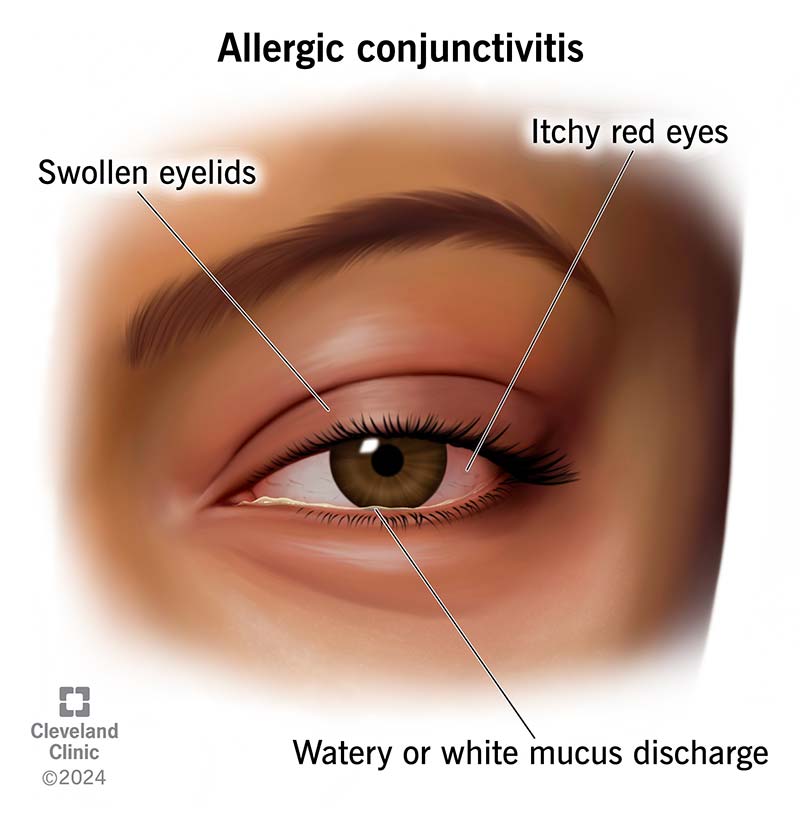Allergic conjunctivitis is when allergens cause inflammation in the tissue that lines your eyelids and the whites of your eyes. Common causes include pollen, dust and pet dander. Symptoms include red, itchy, swollen and watery eyes. Treatment includes antihistamine medications and eyedrops.
Advertisement
Cleveland Clinic is a non-profit academic medical center. Advertising on our site helps support our mission. We do not endorse non-Cleveland Clinic products or services. Policy

Image content: This image is available to view online.
View image online (https://my.clevelandclinic.org/-/scassets/images/org/health/articles/allergic-onjuntivitis.jpg)
Allergic conjunctivitis is a type of pink eye that occurs when allergy-causing foreign substances (allergens) cause inflammation in your conjunctiva. The conjunctiva is a thin membrane that lines your eyelids and helps protect the whites of your eyes (sclera) and keep them moist.
Advertisement
Cleveland Clinic is a non-profit academic medical center. Advertising on our site helps support our mission. We do not endorse non-Cleveland Clinic products or services. Policy
In many people, the foreign substances are harmless. But if you have allergies, your immune system views them as harmful “invaders,” like bacteria or viruses. It then reacts to remove them from your body, causing allergic conjunctivitis symptoms.
Allergic conjunctivitis usually affects both eyes.
The two most common types of allergic conjunctivitis include:
Allergic conjunctivitis is common. It may affect up to 40% of people at some point in their lives.
Allergic conjunctivitis symptoms commonly include:
Advertisement
Some people may also have an itchy or runny nose and sneezing.
Common allergic conjunctivitis causes include:
No, unlike bacterial or viral conjunctivitis, allergic conjunctivitis isn’t contagious.
Anyone can get allergic conjunctivitis. But you’re more likely to have or develop it if you have allergies or a biological family history of allergies. You may also be at greater risk of allergic conjunctivitis if you have pets or live in an area with high pollen counts.
A healthcare provider will review your health history and ask about your symptoms. Tell them if you have any allergies or if anything irritating has gotten in your eyes recently. They’ll look at your eyes for symptoms of conjunctivitis, including:
If they suspect you have allergic conjunctivitis, they may refer you to an allergist (immunologist). An allergist may order allergy tests to confirm their diagnosis, including:
It can be difficult to tell what causes conjunctivitis. But itchy, watery eyes are generally more common with allergic conjunctivitis and are present in both eyes. Viral or bacterial conjunctivitis typically only involves one eye. Allergic conjunctivitis also lasts longer than bacterial or viral conjunctivitis. Your symptoms may go away and come back throughout the allergy seasons.
If you have conjunctivitis symptoms, it’s best not to guess. Contact a healthcare provider to get treatment.
The only way to treat allergic conjunctivitis is to avoid the cause. First-line treatment typically involves avoiding touching your eyes, home remedies and over-the-counter (OTC) or prescription medications to help ease your symptoms.
Home remedies may include:
Over-the-counter or prescription medications may include:
Advertisement
In severe cases of allergic conjunctivitis that you can’t manage with home remedies or over-the-counter or prescription medications, a healthcare provider may recommend allergy immunotherapy (allergy shots or allergy drops). They’ll expose you to small amounts of allergens and gradually increase the dosage over several months. Gradual exposure creates a tolerance to the allergen. The next time you encounter the allergen, you won’t have symptoms, or they’ll be mild.
Yes, Benadryl® (diphenhydramine) can help treat allergic conjunctivitis symptoms. However, one of its side effects is sleepiness. It’s a good idea to take it before going to sleep.
Allergists recommend taking second-generation antihistamines rather than diphenhydramine. Second-generation antihistamines are more effective, have fewer side effects and have no association with dementia.
In general:
Advertisement
You can cure allergic conjunctivitis with allergy shots. You can also help reduce the symptoms by avoiding known allergens and taking medications.
It depends. Your body is unique, including your immune system. Your allergic conjunctivitis symptoms may last less than an hour. They can also last for days, weeks or even months. It depends on what you’re allergic to and the severity of your allergy.
Avoiding known allergens is the best way to prevent allergic conjunctivitis. You may also take antihistamines or other medications daily to help manage your symptoms.
Other tips to help avoid allergic conjunctivitis symptoms include:
See a healthcare provider, allergist or eye care specialist if you regularly have allergic conjunctivitis symptoms that affect your day-to-day quality of life.
You may want to ask your provider:
Advertisement
People often mistake bacterial or viral conjunctivitis with allergic conjunctivitis. A healthcare provider can usually diagnose the different types of pink eye according to:
Allergic conjunctivitis can make you dread the spring and summer months or keep you away from friends or family who have pets. But you can still enjoy the longer days, warmer temperatures and pet scratches by taking a few extra steps. You can help avoid allergens by running a HEPA filter, vacuuming regularly and keeping eyedrops on hand. Talk to a healthcare provider about what medications can help reduce or prevent allergic conjunctivitis symptoms.

Sign up for our Health Essentials emails for expert guidance on nutrition, fitness, sleep, skin care and more.
Learn more about the Health Library and our editorial process.
Cleveland Clinic’s health articles are based on evidence-backed information and review by medical professionals to ensure accuracy, reliability and up-to-date clinical standards.
Cleveland Clinic’s health articles are based on evidence-backed information and review by medical professionals to ensure accuracy, reliability and up-to-date clinical standards.
Cleveland Clinic’s ophthalmologists and optometrists have the highest training available. We provide exams, vision correction and care for many eye conditions.
